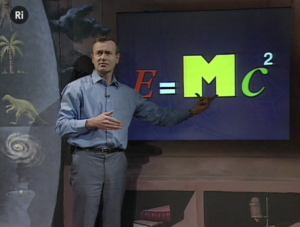 In 2016 the Royal Institution commissioned a book pulling together a ‘baker’s dozen’ of the finest Christmas Lectures since 1885. One of the lectures chosen was the 1993 lecture by Professor Frank Close entitled ‘The Cosmic Onion‘.
In 2016 the Royal Institution commissioned a book pulling together a ‘baker’s dozen’ of the finest Christmas Lectures since 1885. One of the lectures chosen was the 1993 lecture by Professor Frank Close entitled ‘The Cosmic Onion‘.
Frank’s journey into science communication started through writing for Nature and then New Scientist. A distinguished particle physicist, Frank’s CV takes in many of the world’s most important places for breakthroughs in physics: Stanford, CERN, Daresbury and Rutherford Appleton Lab. He is now Emeritus Professor at the University of Oxford.
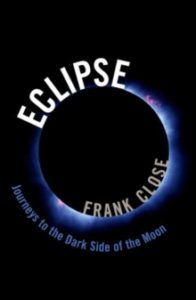 He is also one of the world’s foremost experts on eclipses, having travelled all over the world to witness them. Frank also helped found the annual ATOM Festival or Science and Technology in Abingdon.
He is also one of the world’s foremost experts on eclipses, having travelled all over the world to witness them. Frank also helped found the annual ATOM Festival or Science and Technology in Abingdon.
But it is as a writer and populiser of scientific ideas that Frank is best known. He has written critically acclaimed books on the neutrino, antimatter, the science of symmetry (‘Lucifer’s Legacy‘) and the story behind the hunt for the Higgs Bosun (‘The Infinity Puzzle‘).
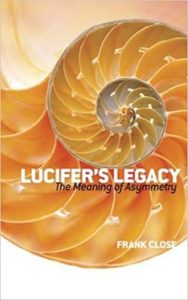
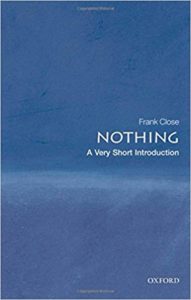
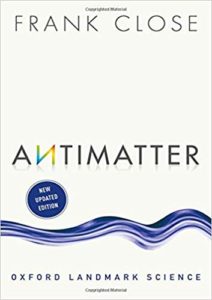
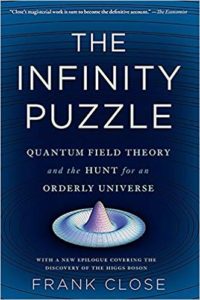
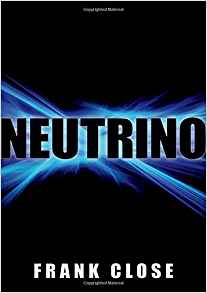
In recent years, Frank has written about the stories behind the atomic spies, and his latest book ‘Trinity: The Treachery and Pursuit of the Most Dangerous Spy in History‘ (published in 2019) details the gripping story of Klaus Fuchs, who worked on both the Manhattan Project and at the UK’s nuclear laboratory at Harwell, and who co-ordinated the leaking of critical information that allowed the Soviet Union to develop their own atomic bomb.
Frank was vice-president of the British Association for the Advancement of Science, has received the Royal Society’s Michael Faraday Prize and the Institute of Physics Kelvin Medal for outstanding contributions to science communication. Awarded an OBE in 2000 for services to science, in 2019 Frank was interviewed by Jim Al-Khalili on the BBC’s ‘The Life Scientific‘.
Such is the sheer range and history of Frank’s experiences, the episode is split into two parts.
Part 1 focuses on Science Communication: how he (accidentally) became a science writer in the first place, the story behind that groundbreaking 1993 Christmas Lecture, and finally his experiences as head of communications at CERN when he realised that effectively explaining big science to a wider world was critical in getting popular and political support for all science.
Along the way we explore how close the UK came to pulling out of CERN in the 1980s, how to create an explosion in your bare hands, and the secret to great research: it’s all about asking the right questions apparently…
Part 2 digs further into Frank’s life as a writer – both as the author of bestselling science books such as ‘Neutrino’ and ‘The Infinity Puzzle’ to his latest books that examine the history of the Atomic Spies.
We learn about how Frank got into writing (accidentally, it turns out) and the individuals in publishing who guided him along the way. We discuss the background and content of his latest book “Trinity”, about the extraordinary life – and the secrets that still persist – about nuclear spy Klaus Fuchs.
Trinity was published in 2019, but *this* interview was recorded in 2018, which explains some anomalies in our timing references. But then, perhaps that’s appropriate for someone who has spent his life studying the often weird world of space and time in such fundamental detail…
(A reminder that you can listen now on SoundCloud, iTunes and Stitcher. And for a comprehensive set of show notes, including links, analysis and organisation contact, consider becoming a supporter through Patreon – or email us for more details).
P.S. You can watch all five episodes of the Christmas Lectures – as broadcast by the BBC – on the Royal Institution website here. Accessible to anyone – young or old – it’s remains a thoroughly entertaining journey through physics, the universe and, well, everything.
